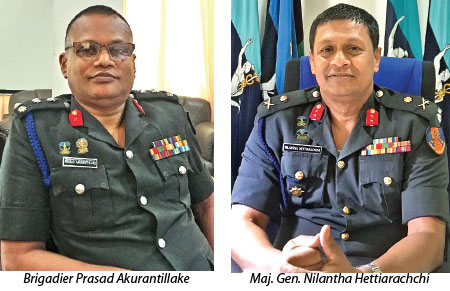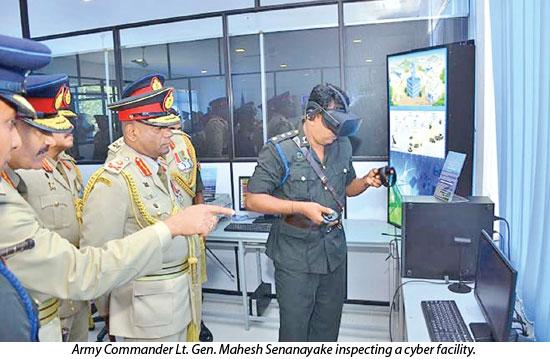
Unlike traditional conflicts fought face to face, Cyber Warfare comes in many shapes and sizes, and it is increasingly clear that it is going to be a significant component of pretty much every present and future conflict. Unlike in traditional warfare where troops using conventional weapons (such as guns and missiles) confront the enemy, future wars will be fought by hackers using computer codes to attack an enemy’s infrastructure from far out locations. Unlike standard military attacks, a cyber attack can be launched instantaneously from any distance, with little obvious evidence in the build-up, and it is often extremely hard to trace such an attack back to the source.
 Such cyber attacks are now becoming more common, sophisticated and damaging and recently, cyber attacks have been part of hybrid warfare. Therefore, as the whole world is currently heading towards a knowledge based digital era, the Sri Lanka Army, in keeping with this trend, has taken the initiative to strengthen its professional skills and abilities in this area as well. In order to withstand these potential threats in the future, the Directorate of IT of the Sri Lanka Army has initiated cyber security programs with the help of the Chief Signal Officer Branch.
Such cyber attacks are now becoming more common, sophisticated and damaging and recently, cyber attacks have been part of hybrid warfare. Therefore, as the whole world is currently heading towards a knowledge based digital era, the Sri Lanka Army, in keeping with this trend, has taken the initiative to strengthen its professional skills and abilities in this area as well. In order to withstand these potential threats in the future, the Directorate of IT of the Sri Lanka Army has initiated cyber security programs with the help of the Chief Signal Officer Branch.
Army Commander Lt. Gen. Mahesh Senanayake at a media briefing celebrating the 75th anniversary of the Signal Corps, highlighted the important role played by the Signal Corps in the context of modern warfare, adding that it is not the same army that existed in the 1980’s and they have to be prepared to face the future and take on new challenges.
In keeping with this concept, the Sri Lanka Army’s Signal Corps concurrent to its 75th Anniversary celebrations has organised a Cyber Security Symposium under the theme “Cyberspace, Perpetual Battlefront for the Future” and an ICT exhibition on 28th and 29th November, at the BMICH.
According to Brigadier Prasad Akurantillake the Director Information Technology, this is an exhibition never before experienced in Sri Lanka, where one could experience in virtual reality, the way communication evolved over time.
“We will be showcasing the evolution of communication from the stone age to the current era and the future. We have chosen a very unique method for this. We will be constructing a sort of space shuttle at the entrance to the exhibition, where we would exhibit the evolution of communication. This entire space capsule model is constructed from scratch by the army and it will give spectators an experience of time travel with 365 degree projection and virtual animation.”
 When asked how this concept was developed, the Chief Signal Officer of the Sri Lanka Army, Maj. Gen. Nilantha Hettiarachchi said, ‘when we were handed over this task, we wanted to give our young officers an opportunity to prove their talents.
When asked how this concept was developed, the Chief Signal Officer of the Sri Lanka Army, Maj. Gen. Nilantha Hettiarachchi said, ‘when we were handed over this task, we wanted to give our young officers an opportunity to prove their talents.
After brainstorming sessions, we came up with this space shuttle concept. When one steps into this shuttle, the sounds and visuals would take a spectator through time and give them a visual experience of the evolution of communication. We want to preserve such data as we don’t have such a museum for our younger generation to see later in life. In other countries they preserve such data and that is why we decided to take this opportunity to preserve all this information for later generations and see at what level communication was in the past.
Today, even a toddler knows how to use a smart phone.” He also noted that they had invited around 800 schools to bring in their students, to experience this novel concept. According to Maj. Gen. Hettiarachchi, as children are the future of the country, this will be a good way to educate them.
He said such projects could not be undertaken easily due to the high cost of construction. However, he added that as the army possesses the manpower, it is easier for them to take on such ambitious projects.
“By engaging in such initiatives, on the directives of the Commander of the Army, the people will understand that the army is always committed in serving the people of this country, not just in combat”.
The Sri Lanka Signal Corps is the prime organisation in the army which is responsible for providing communication and information technology support for the command and administration of the army, as well as the organisation responsible for the Cyber Security of the army.
The Sri Lanka Signal Corps was inaugurated in 1943 under the Royal British Army as a small unit. However, today it has developed into an organisation in charge of communication, electronic warfare, and information technology and cyber security of the Sri Lanka Army.
During the three decades of war with LTTE terrorists, the Signal Corps played a pivotal role, not just in providing ICT and electronic warfare support, but also performing an infantry role having formed reinforcement (RFT) Battalions.
In other words one could call them the silent heroes, for without their support, many of the battle ground operations would not have been possible.
The Signal Corps could be termed as the central nervous system of the military. Without the support of the Signal Corps, getting supplies to the soldiers would not have been possible, identifying imminent threats and enemy lines would not have been possible, evacuating the injured would not have been possible and communicating between the infantry troops and the commanding officers would also not have been possible.
These are just a few of the tasks performed by the Signals Corps during the war.
If we were to detail their entire role during the war, it would run into thousands of pages. In short, none of the other units of the military could function without the Signal Corps, which is the link between all units.
He noted that there are 11 Signal Regiments deployed across the country in Mulaithivu, Punani, Jaffna, Anuradhapura, Kosgama, in Palali – for the ICT requirements in the Northern region, and elsewhere plus the recently formed Cyber Regiment, established last year.
“For the training of the Signals Officers, there is a very sound training establishment situated in Kandy, equipped with State of the Art facilities and laboratories to train degree holders.
Apart from that they also have an independent squadron which looks after the communication requirements of the Army Headquarters and ICT requirements of the army. Once the Army HQ shifts to Akeregoda we will form another regiment.
Even in a state of emergency in the element, under the commander of the army can assist and support the Rupavahini Corporation, ITN, Telecom, Sri Lanka Post and all other communication establishments utilising military personnel” he explained.
Today, the focus of the army, according to its Commander’s concept, is to deploy 1/3rd of the army for nation building purposes. “There are a lot of projects currently underway manned by the army. We have engaged basically in almost every aspect of society,” Hettiarachchi added.
He said they expect over 75,000 visitors at the exhibition per day, especially school children.
Being a developing country, we need to stay connected and know what is happening around the world. “If we are not aware, we cannot be prepared.The damage that can be caused through cyber attacks is far greater than the Hiroshima nuclear bomb.”
The Symposium on November 28 would be attended by many speakers including military leaders from the British, Indian, Bangladesh, and Pakistan armies, guest speakers from Singapore, China, Russia and experts in this field from Sri Lanka.
In addition several local universities and institutions would also be provided stalls free of charge. In all, there would be about 175 stalls.
